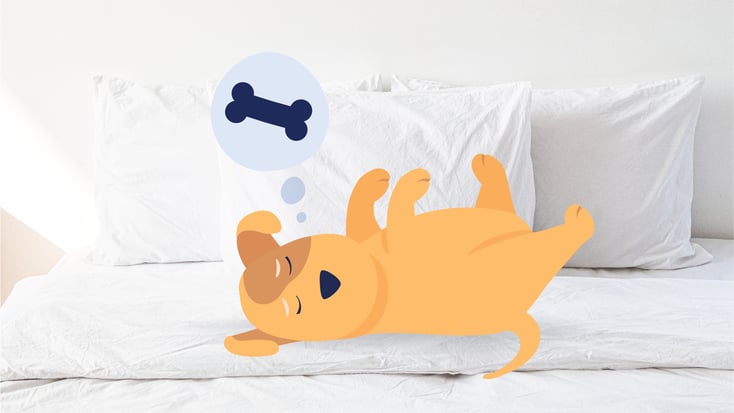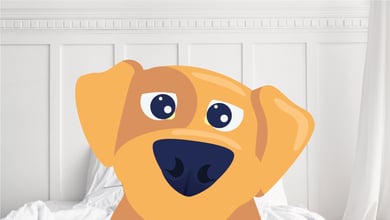What Do Dogs Dream About?

Table of Contents
As in-home veterinarians specializing in dog and cat medicine, we are frequently asked questions about common dog behaviors and, specifically, do dogs dream? The answer is yes; just like people, dogs do indeed dream.
Read on to learn about the science behind dogs’ dreams and how you can help your furry friend get a good night’s sleep.
Key Takeaways:
- Dogs do indeed dream, similar to humans, as they go through different sleep stages, including REM sleep.
- Dogs are believed to dream about their daily experiences, such as playing fetch or interacting with their owners.
- If your dog exhibits agitation at night or struggles to settle down for sleep, consider scheduling a veterinary check-up to rule out anxiety or pain.
Do Dogs Dream?
Yes, dogs do dream. Like humans, dogs go through various stages of sleep, including the REM (rapid eye movement) stage, which is associated with dreaming.
How Do You Know If Your Dog Dreams?
You can observe sure signs that indicate your dog is dreaming. During sleep, dogs may exhibit involuntary movements, such as twitching their legs, wagging their tails, or making sounds like barking or whimpering. Their eyes may also move rapidly beneath their closed eyelids. These behaviors suggest that your dog is actively experiencing a dream.
What Do Dogs Dream About?
It's impossible to know precisely what dogs dream about, but it's believed that they dream about experiences they've had during the day. For example, if your dog spends the day at the park playing fetch, they may dream about chasing after a ball. If you wonder if dogs dream about their owners, scientists believe our dogs love us so much that they also dream about us.
It's also thought that dogs may be able to dream about things they haven't yet experienced, such as chasing after a squirrel or catching a bird. Dogs may also dream about things that scare them, such as thunderstorms, loud noises, or a traumatic experience.
Should My Pet Be Seen by a Veterinarian?
1. Have you noticed changes in your pet’s appetite?
2. Does your pet have diarrhea or loose stools?
3. Have you noticed changes in your pet’s thirst/water consumption?
4. Is your pet having accidents in the house?
5. Is your pet pacing and unable to settle?
6. Is your pet panting more than usual?
7. Is your pet whining or vocalizing more than usual?
8. Is your pet shaking more than usual?
9. Is your pet hiding or avoiding physical contact more than usual?
10. Is your pet more lethargic and sleeping more than usual?
11. Are you concerned about changes in your pet’s behavior?
12. Is your pet scratching their ears?
13. Is your pet licking their paws more than usual?
14. Does your pet have a rash?
15. Is your pet moving more slowly than usual or having a harder time getting up or down?
View Results
Should My Pet Be Seen by a Veterinarian?
1. Have you noticed changes in your pet’s appetite?
2. Does your pet have diarrhea or loose stools?
3. Have you noticed changes in your pet’s thirst/water consumption?
4. Is your pet having accidents in the house?
5. Is your pet pacing and unable to settle?
6. Is your pet panting more than usual?
7. Is your pet whining or vocalizing more than usual?
8. Is your pet shaking more than usual?
9. Is your pet hiding or avoiding physical contact more than usual?
10. Is your pet more lethargic and sleeping more than usual?
11. Are you concerned about changes in your pet’s behavior?
12. Is your pet scratching their ears?
13. Is your pet licking their paws more than usual?
14. Does your pet have a rash?
15. Is your pet moving more slowly than usual or having a harder time getting up or down?
Share Quiz
How to Help a Dog Get the Best Sleep
Like humans, dogs need plenty of restful sleep to stay healthy and happy. Here are some tips to help your dog get the best sleep possible:
- Create a comfortable sleeping environment: Provide your dog a cozy bed in a quiet, dark room.
- Stick to a consistent sleep schedule: Dogs thrive on routine, and your dog will likely go to bed at the same time you do and rise when you get up in the morning. Research shows that the heartbeats of dogs and their humans sync up when sleeping next to each other, resulting in a mutual benefit!
- Give your dog plenty of exercise: Dogs who exercise regularly are more likely to sleep well at night. Ensure your dog gets plenty of physical and mental stimulation during the day.
BetterVet Can Answer All Your Dog Questions
In conclusion, there is evidence that dogs do dream, and it's believed that they dream about experiences they've had during the day. During REM sleep, dogs may twitch, bark, whimper, or move their legs as if running or chasing something. Your dog can get the best sleep possible by creating a comfortable environment and providing plenty of exercise and playtime.
If your dog becomes agitated at night or can’t seem to settle down for a good stretch of sleep, book a veterinary check-up, as they may be experiencing anxiety or pain.
Chat online with a veterinarian from BetterVet if you have any additional questions.
Frequently Asked Questions
Do all dogs dream?
Yes, it is believed that all dogs dream, but some may dream more often than others.
How often do dogs dream?
Dogs can dream several times throughout the night during the REM stage of sleep.
Do dogs have nightmares?
Dogs can have nightmares, but it's believed that they may experience more positive dreams than negative ones.
Do dogs dream in color?
It is widely believed that dogs see black and white and shades of yellow, blue, and grey. Their dreams are likely to be in these colors as well.
Should I wake my dog if they are having a bad dream?
It's generally not recommended to wake up a dog while they are dreaming, even if it seems they are having a bad dream. Sudden awakenings can cause disorientation and stress, so it’s best to wait until your dog wakes up naturally and offer comfort and reassurance if they seem anxious or upset. If your dog is experiencing frequent nightmares or appears to be in distress during sleep, check in with your veterinarian about ways to address this behavior.







